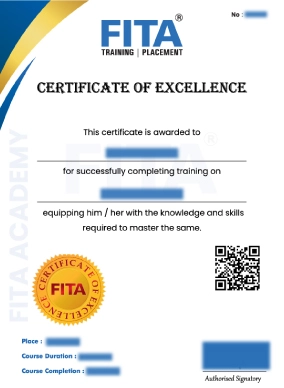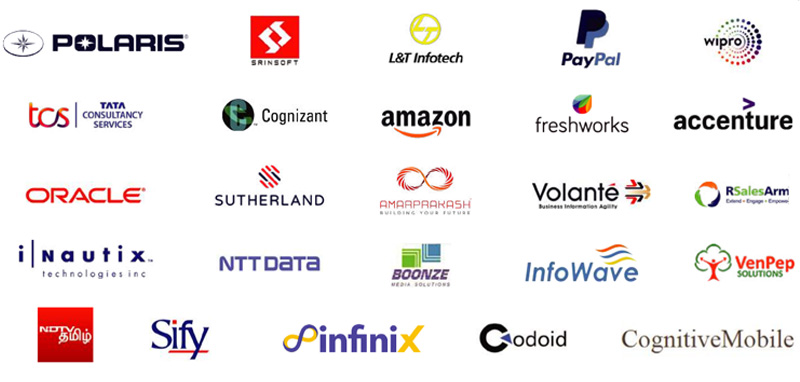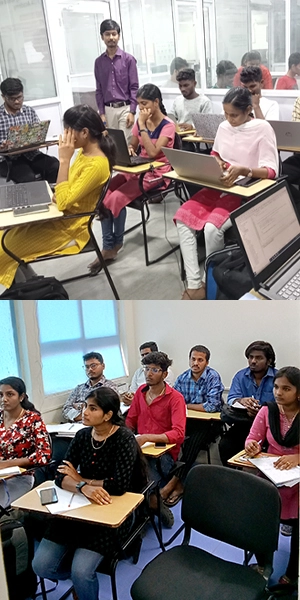Course Highlights and Why MEAN Stack Training in Bangalore at FITA Academy?
Upcoming Batches
- 14-04-2025
- Weekdays
- Monday (Monday - Friday)
- 17-04-2025
- Weekdays
- Thursday (Monday - Friday)
- 19-04-2025
- Weekend
- Saturday (Saturday - Sunday)
- 26-04-2025
- Weekend
- Saturday (Saturday - Sunday)
Classroom Training
- Get trained by Industry Experts via Classroom Training at any of the FITA Academy branches near you
- Why Wait? Jump Start your Career by taking the MEAN Stack Training in Bangalore!
Instructor-Led Live Online Training
- Take-up Instructor-led Live Online Training. Get the Recorded Videos of each session.
- Travelling is a Constraint? Jump Start your Career by taking the MEAN Stack Online training!
Trainer Profile
- FITA Academy strongly endorses the blended learning approach, and we give students the ideal mix of academic and practical knowledge of the MEAN Stack ideas.
- The MEAN Stack Developer Course Trainers at FITA Academy are Real-Time professionals who offer practical instruction on MEAN Stack’s core elements.
- The instructors at FITA Academy broaden students’ expertise by teaching them how to code a MEAN Stack application in detail.
- The MEAN Stack Trainers at FITA Academy provide each student with the necessary individualised attention and comprehensive instruction for developing Web Applications.
- Our instructors help the students create an effective resumes and increase their confidence by giving them insightful advice on interview questions and handling interviews through mock interview sessions.
Learn at FITA Academy & Get Your
Dream IT Job in 60 Days
like these Successful Students!
Features of MEAN Stack Training in Bangalore at FITA Academy
Real-Time Experts as Trainers
At FITA Academy, you will learn from industry experts eager to share their knowledge with learners. You will also get personally mentored by the Experts.
LIVE Project
Get the opportunity to work on real-time projects that will provide you with deep experience. Showcase your project experience and increase your chances of getting hired!
Certification
FITA Academy offers certification. Also, get ready to clear global certifications. 72% of FITA Academy students appear for global certifications and 100% of them clear it.
Affordable Fees
At FITA Academy, the course fee is not only affordable, but you can also pay it in installments. Quality training at an affordable price is our motto.
Flexibility
At FITA Academy, you get the ultimate flexibility. Classroom or online training? Early morning or late evening? Weekday or weekend? Regular Pace or Fast Track? - Choose whatever suits you best.
Placement Support
Tied-up & signed MOUs with over 3000+ small & medium-sized companies to support you with opportunities to kick-start & advance your career.
Why Learn MEAN Stack Training in Bangalore at FITA Academy?
Live Capstone Projects
Real time Industry Experts as Trainers
Placement Support till you get your Dream Job offer!
Free Interview Clearing Workshops
Free Resume Preparation & Aptitude Workshops

MEAN Stack Certification Training in Bangalore
MEAN Stack Course Certification shows that a candidate has acquired an in-depth understanding and can develop web pages in the MEAN Stack Platform. This certification confirms that the individual has learned the abilities required to work as a MEAN Stack Developer or Full Stack Developer. Submitting this certificate with your resume prioritises your profile during the interview and provides access to a wide range of professional and career prospects.
FITA Academy‘s MEAN Stack Training in Bangalore is designed to enhance the skills of aspiring MEAN Stack Developers under the guidance of experienced industry professionals. The course is led by experts with over 8 years of expertise in Web Application Development, ensuring a comprehensive learning experience. Our MEAN Stack Developer Course Trainers provide valuable insights into the latest market trends, enriching your knowledge and keeping you updated with industry demands.
Have Queries? Talk to our Career Counselor for more Guidance on picking the
right Career for you!
Placement Session & Job Opportunities after completing MEAN Stack Training in Bangalore

The majority of businesses today prefer developers that can effectively build every element of an application from top to bottom. In that situation, MEAN is a well-known Full Stack Development solution that helps businesses create effective apps with minimal resources. One of the well-liked career possibilities for those looking for rewarding career alternatives in the Web Applications Development area is MEAN Stack Developer.
Between 2017 and 2026, it is predicted that career growth in the MEAN Stack will increase by a total of 18%. This is a result of the increased global need for reliable online applications. Currently, businesses are looking for competent individuals who can work on both front-end and back-end apps and manage the database system.
Accenture, Bosch, Cognizant, HCL, Capgemini, Infosys, and TCS are reputable companies employing MEAN Stack developers. In India, a MEAN Stack Developer can expect to make an average annual income of Rs. 5,28,436.
The average compensation is anticipated to increase from Rs.12,00,000 to Rs.15,00,000 annually as one gains expertise. A MEAN Stack Developer makes approximately $ 1,20,000 a year worldwide. Additionally, with years of expertise and skill sets acquired, you can work as a Freelancer. Under the direction of Real-time professionals, MEAN Stack Training Institute in Bangalore at FITA Academy instils in the students the professional skill sets essential for a MEAN Stack Developer.
Success Story of MEAN Stack Training in Bangalore
Nikhil S
I had a wonderful learning experience with the MEAN Stack Training in Bangalore at FITA Academy. The trainers were highly knowledgeable and skilled, and they provided in-depth explanations of each component. The course structure was well-designed, covering both theory and practical aspects. The hands-on projects helped me gain confidence in applying the concepts I learned. Thank you, FITA.
Catherine D’Souza
I am extremely satisfied with the MEAN Stack Course in Bangalore at FITA Academy. The trainers were highly skilled and supportive. They provided personalised attention and guidance. The training environment was conducive to learning, and the practical sessions were engaging and informative. Thanks to FITA Academy.
Anandhi S
The MEAN Stack Development Course in Bangalore at FITA Academy provided a solid foundation for my web development journey. The trainers had in-depth knowledge of each component and shared practical tips and best practices. The training was well-structured, starting from the basics and gradually progressing to advanced topics. I am grateful for this course and would recommend it to my peers.
Pranav Sathish
I attended the MEAN Stack training in Bangalore at FITA Academy and found it to be beneficial. The trainers were friendly and approachable. They took the time to explain the topics in a simple manner. The practical exercises helped me get practical experience working with MEAN Stack components. Although some parts were challenging, the trainer supported me in clarifying my doubt. It was a great experience.
Madhav P
I enrolled in MEAN Stack Development Course in Bangalore to enhance my web development skills. The trainers were skilled and shared their practical experiences, which was helpful. The training covered the essential concepts and gave me a good understanding of MEAN Stack development. The practical sessions were very helpful, and I am thankful for the training and the skills I gained.
Our Students Work at

Frequently Asked Question (FAQ) about MEAN Stack Training in Bangalore
- Experts with more than 10 years of expertise in the field of web application development created and delivered the MEAN Stack Development Course at FITA Academy.
- 60+ hours of in-depth course coverage
- More than 1,00,000+ students believe in FITA Academy.
- With students and employed IT workers in mind, courses are offered at reasonable prices and at convenient times.
- More than 3000 small, medium, and large-scale businesses have placement agreements with FITA Academy, and these businesses have vacancies for MEAN Stack Developers, Full Stack Developers, and other positions in the Web Development Application industry.
- The dedicated placement officer at FITA Academy supports the students by providing placement assistance.
- The placement office assists the students with numerous practice interviews and group discussions to make them feel confident during the interview.

In the world of web development, MEAN Stack has emerged as a popular choice for building modern and efficient web applications. MEAN stands for MongoDB, Express.js, Angular, and Node.js, a powerful combination of technologies covering the entire development stack, from the back-end (database) to the front-end. We will explore the components of MEAN Stack in detail, understand their roles in web development, and discuss the merits of using MEAN Stack for building robust applications.
MongoDB
A well-liked NoSQL database management system called MongoDB offers a scalable and adaptable method for storing and retrieving data. It stands out from traditional relational databases by employing a document-oriented model, allowing data storage in a semi-structured format called BSON ( Binary JSON). Here are some key aspects of MongoDB:
Document-Oriented
MongoDB stores data in flexible, JSON-like documents, making it easy to represent complex hierarchical relationships and dynamic schemas. Each document can have its own structure, enabling developers to store and retrieve data without rigid pre-defined schemas.
Scalability and Performance
MongoDB excels in scalability, allowing for distributed and horizontally scalable deployments. It is able to manage big data volumes and high traffic loads thanks to the capability for sharding, which divides data across numerous servers to enable high availability.
Flexibility in Data Modelling
MongoDB’s flexible schema makes it easy to accommodate evolving data requirements. Fields can be added or modified without requiring a schema migration process, allowing for agile development and faster iterations.
Querying and Indexing
MongoDB provides powerful querying capabilities through a flexible and expressive query language. It supports various query operators, including complex aggregations, making it suitable for simple and complex data retrieval operations. Additionally, MongoDB offers indexing support, enabling developers to optimise query performance.
Replication and High Availability
MongoDB supports replication, allowing for automatic data synchronisation across multiple servers. This ensures high availability and data redundancy, enabling failover in case of server failures and providing continuous service uptime.
Integration with Programming languages
MongoDB simplifies interface with well-liked frameworks and systems by providing libraries and drivers for various programming languages. Numerous languages are supported, including Java, Python, and JavaScript.
Community and Ecosystem
MongoDB has a vibrant and active community with extensive documentation, tutorials, and resources available. The ecosystem includes various third-party tools and frameworks that complement MongoDB’s functionalities, further enhancing its usability and extensibility.
Express.js
Express.js is a minimalist web application framework for Node.js that provides robust features for building web applications and APIs. It is designed to be simple, flexible, and unopinionated, allowing developers to create server-side applications efficiently. Here are some key aspects of Express.js:
Lightweight and Fast
Express.js is known for its lightweight nature, allowing for quick application development. It provides a minimalistic core focusing on essential features, resulting in faster performance and efficient resource utilisation.
Middleware Support
Express.js is built around the concept of middleware, which are functions that process incoming requests and perform various tasks such as parsing request bodies, handling cookies, or implementing authentication. The middleware architecture allows for modular and reusable code, making it easy to add functionality to applications.
Routing
Developers can quickly build routes and manage HTTP requests with Express.js’s powerful routing system. It permits the mapping of URL patterns to particular handlers and supports a variety of HTTP methods (GET, POST, PUT, DELETE, etc.), making it simple to construct RESTful APIs.
Angular
Angular is a robust front-end framework developed by Google. It enables MEAN Stack developers to build dynamic, responsive single-page applications (SPAs) with a rich user interface. Angular follows a component-based architecture, allowing developers to create reusable UI components. It provides features like two-way data binding, dependency injection, and declarative templates, enabling efficient development and maintenance of complex applications. MEAN Stack developers use Angular to handle client-side logic, user interactions, and data rendering, providing a seamless and interactive user experience.
Angular provides a comprehensive set of tools and libraries for routing, form handling, and testing, making it easier to develop complex applications. It follows the MVC (Model-View-Controller) architecture, clearly separating concerns. Angular’s large community and extensive documentation make it reliable for building modern, scalable, and maintainable web applications.
Node.js
Node.js is a powerful JavaScript runtime built on Chrome’s V8 engine. It allows developers to run JavaScript code on the server side, enabling the development of scalable and high-performance applications. Node.js utilises an event-driven, non-blocking I/O model, efficiently handling concurrent requests and real-time applications. It has a rich ecosystem of modules and packages available through the Node Package Manager (npm), simplifying the development process. Node.js is widely used for building server-side web applications, APIs, microservices, and other network applications. Its lightweight, efficient nature and large, active community make it popular for modern web development.
Full-Stack Development with MEAN Stack
One of the significant advantages of MEAN Stack is its ability to handle both front-end and back-end development within a unified technology stack. MEAN Stack developers have the expertise to work on all application layers, from the database to the user interface. They can seamlessly switch between different components, sharing code and utilising their JavaScript skills throughout development. This unified approach improves the development process. This unified approach improves development speed, code maintainability and foster collaboration between front-end and back-end developers.
Benefits of using MEAN Stack
MEAN Stack offers several benefits that make it a popular choice for modern web development
JavaScript Everywhere
MEAN Stack allows developers to use JavaScript throughout the entire development stack, eliminating the need for context-switching between different programming languages. This results in a more consistent and streamlined development process.
Code Reusability
MEAN Stack promotes code reusability by enabling developers to share code between the front-end and back-end components. For example, JavaScript models defined in Angular can be reused on the server side with Node.js, reducing duplication of effort and improving code maintainability.
Increased Developer Productivity
MEAN Stack’s unified approach, coupled with a vast ecosystem of libraries and packages, allows developers to be more productive. They can use the MEAN Stack community’s existing modules, libraries, and tools to accelerate development. Additionally, the ability to use JavaScript on both the client and server sides reduces the learning curve for developers and enables them to work efficiently.
Rapid Prototyping
MEAN Stack’s simplicity and flexibility make it ideal for rapid prototyping. Developers can quickly create functional prototypes and iterate on them based on user feedback. With MEAN Stack’s modular architecture, adding or modifying components as needed is easy, facilitating a fast and iterative development process.
Scalability and Performance
MEAN Stack components are designed to handle high traffic levels and scale quickly.MongoDB’s horizontal scaling allows applications to handle growing data volumes, while Node.js’ Non-blocking I/O model ensures optimal performance under heavy loads with Angular’s efficient rendering and caching mechanisms. MEAN Stack applications can provide a smooth and responsive user experience.
Uses and applications of MEAN Stack
Single-page Applications (SPAs)
MEAN Stack’s combination of Angular on the front-end and Node.js on the back-end is particularly suited for building SPAs. SPAs provide a smooth and interactive user experience by dynamically updating content without requiring page reloads.
Real-time Applications
MEAN Stack’s event-driven architecture is ideal for building real-time applications such as chat applications, collaborative tools, and analytics dashboards. The non-blocking nature of Node.js allows applications to handle multiple concurrent connections efficiently.
E-commerce Platforms
MEAN Stack’s scalability, flexibility, and performance make it suitable for building e-commerce platforms. Developers can leverage MongoDB’s document data storage to handle product catalogues, Express.js for managing APIs and server-side logic, Angular for building an engaging user interface, and Node.js for handling high traffic and real-time updates.
Content Management Systems (CMS)
MEAN Stack can be used to build CMS platforms, enabling content creators to manage and publish content efficiently. The dynamic nature of MEAN Stack allows for easy content updates, versioning, and collaboration between multiple users.
Learning and Resources
Aspiring developers can pursue various learning resources to become proficient in MEAN Stack development. These are as follows,
Online Tutorials and Documentation
The official documentation of each MEAN Stack component provides comprehensive information, tutorials, and examples to get started. Online tutorials and blog posts by experienced developers can also offer valuable insights and best practices.
Online Courses and Bootcamps
Many online learning platforms offer dedicated courses and boot camps on MEAN Stack development. These courses provide structured learning paths, hands-on projects, and mentorships to help learners gain practical skills and confidence.
Open-source Projects and Communities
Participating in open-source MEAN Stack projects and engaging with the developer community can enhance learning and provide collaboration and knowledge-sharing opportunities.
Books and eBooks
There are several books and eBooks available that cover MEAN Stack development in detail. These resources offer in-depth explanations, code examples, and practical tips for building MEAN Stack applications.
MEAN Stack has revolutionised web development by combining MongoDB, Express.js, Angular, and Node.js into a powerful, unified stack. MEAN Stack developers possess the skills to work across the entire development spectrum, from the database to the front-end user interface. The use of JavaScript throughout the stack, code reusability, and the scalability and performance advantages make MEAN Stack an excellent choice for building modern web applications. By embracing MEAN Stack, developers can create robust, scalable, and feature-rich applications that cater to the evolving needs of the digital world.


